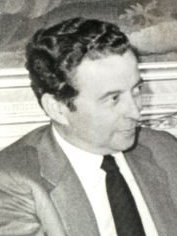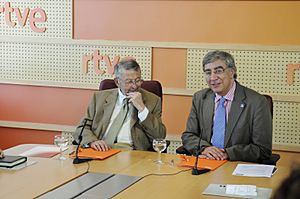Alberto Oliart facts for kids
Quick facts for kids
Alberto Oliart
|
|
|---|---|

Oliart in 1982
|
|
| Chair of RTVE | |
| In office 26 November 2009 – 6 July 2011 |
|
| Preceded by | Luis Fernández Fernández |
| Succeeded by | Leopoldo González-Echenique |
| Minister of Defence of Spain | |
| In office 26 February 1981 – 3 December 1982 |
|
| Prime Minister | Leopoldo Calvo-Sotelo |
| Preceded by | Agustín Rodríguez Sahagún |
| Succeeded by | Narcís Serra |
| Minister of Health and Social Security of Spain | |
| In office 9 September 1980 – 26 September 1981 |
|
| Prime Minister | Adolfo Suárez |
| Preceded by | Juan Rovira Tarazona |
| Succeeded by | Jesús Sancho Rof |
| Minister of Industry and Energy of Spain | |
| In office 5 July 1977 – 28 February 1978 |
|
| Prime Minister | Adolfo Suárez |
| Preceded by | Carlos Pérez de Bricio |
| Succeeded by | Agustín Rodríguez Sahagún |
| Member of the Congress of Deputies | |
| In office 9 March 1979 – 31 August 1982 |
|
| Constituency | Badajoz |
| Personal details | |
| Born | 29 July 1928 Mérida, Spain |
| Died | 13 February 2021 (aged 92) Madrid, Spain |
| Political party | UCD (1978–1980s) |
| Alma mater | University of Barcelona |
| Occupation | Politician, state lawyer, business executive, stockbreeder, writer |
Alberto Carlos Oliart Saussol (born July 29, 1928 – died February 13, 2021) was an important Spanish politician and business leader. He served as a government minister three times during a special time in Spain called the Spanish transition to democracy. He also led the national TV and radio company, RTVE, from 2009 to 2011.
Contents
Early Life and Career
Alberto Oliart was born on July 29, 1928, in Mérida, Spain. His father, Antonio Oliart Ruiz, had to leave Barcelona during the Spanish Civil War. He found safety in Mérida and later in Burgos.
Alberto studied Law at the University of Barcelona, finishing in 1950. In 1953, he became a State Lawyer, a job he held until 1965. After that, he became a top finance officer at Renfe, Spain's national railway company. He also served on the boards of several large companies.
Political Journey
Minister of Industry and Deputy
In 1977, Prime Minister Adolfo Suárez chose Alberto Oliart to be the Minister of Industry and Energy. He held this position until February 1978.
Later that year, Oliart joined a political party called the Union of the Democratic Centre (UCD). He was elected as a member of the Congress of Deputies for Badajoz in the 1979 general election. From May 1979 to September 1980, he led the Defense Committee in the Congress.
Minister of Health
On September 8, 1980, Alberto Oliart became the Minister of Health and Social Security. He served in this role until February 26, 1981.
Minister of Defence
Just a few days after a failed coup attempt in Spain (known as 23-F), Oliart was appointed Minister of Defence on February 26, 1981. He worked under the new Prime Minister, Leopoldo Calvo Sotelo.
One of his first tasks was to meet with military leaders to understand their views on the coup. He learned that many agreed with the idea of a new government. During the trial of those involved in the coup, Oliart had to step in to ensure order in the court. The military court gave light sentences, which many people disagreed with. Oliart ordered the prosecutor to appeal the sentences. The Supreme Court later increased the prison terms for the coup plotters.
Oliart also worked to reform the Superior Center of Defense Information, Spain's intelligence agency. He appointed a new director to help control and prevent any suspicious military actions after the coup. This agency later uncovered another coup plot that was planned for October 1982, just before the general election. Oliart and other ministers were informed, and the plot was stopped.
A major achievement during his time as Minister of Defence was Spain's entry into NATO on May 30, 1982. NATO is a military alliance between several countries. He also appointed the first civilian to a high position in the Ministry of Defence.
After the PSOE party won the 1982 general election, Oliart left his position on December 2, 1982.
Leading RTVE
On November 11, 2009, Alberto Oliart was chosen to be the President of RTVE, Spain's public radio and television company. He officially started his role on November 26, 2009.
During his time as president, TVE stopped showing advertisements. It also became very popular with viewers. He resigned on July 6, 2011, for personal reasons.
Personal Life and Legacy
Alberto Oliart was married to Carmen de Torres Flores, and they had six children. One of his daughters, Isabel Oliart, married the famous singer-songwriter Joaquín Sabina.
After leaving politics, Oliart returned to his work as a lawyer. He also started a business raising cattle in Badajoz. He enjoyed writing and won an award in 1997 for his autobiographical book, Against Oblivion ("Contra el olvido"). He wrote another book about his life in 2019, called The years that changed everything ("Los años que lo cambiaron todo").
Alberto Oliart passed away on February 13, 2021, at the age of 92, in Madrid. He died from COVID-19 during the COVID-19 pandemic.
Decorations
- Grand Cross of the Order of Charles III (1978)
- Grand Cross of the Order of Isabella the Catholic (1982)
- Grand Cross of the Order of Military Merit, with White Decoration (1985)
- Grand Cross of the Order of the Agricultural, Fishing and Food Merit (1994)
- Medal of Extremadura (1998)
- Grand Cross of the Order of Naval Merit (1999)
See also
 In Spanish: Alberto Oliart para niños
In Spanish: Alberto Oliart para niños
 | Emma Amos |
 | Edward Mitchell Bannister |
 | Larry D. Alexander |
 | Ernie Barnes |


